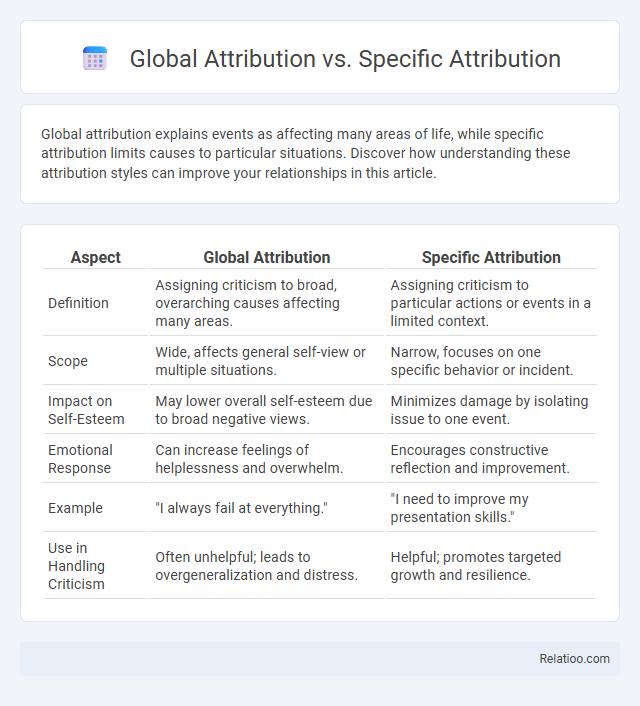Global attribution explains events as affecting many areas of life, while specific attribution limits causes to particular situations. Discover how understanding these attribution styles can improve your relationships in this article.
Table of Comparison
| Aspect | Global Attribution | Specific Attribution |
|---|---|---|
| Definition | Assigning criticism to broad, overarching causes affecting many areas. | Assigning criticism to particular actions or events in a limited context. |
| Scope | Wide, affects general self-view or multiple situations. | Narrow, focuses on one specific behavior or incident. |
| Impact on Self-Esteem | May lower overall self-esteem due to broad negative views. | Minimizes damage by isolating issue to one event. |
| Emotional Response | Can increase feelings of helplessness and overwhelm. | Encourages constructive reflection and improvement. |
| Example | "I always fail at everything." | "I need to improve my presentation skills." |
| Use in Handling Criticism | Often unhelpful; leads to overgeneralization and distress. | Helpful; promotes targeted growth and resilience. |
Understanding Attribution: Global vs Specific
Understanding attribution involves distinguishing between global attribution, which assigns causes to broad, overarching factors affecting multiple situations, and specific attribution, which targets particular, isolated causes related to a single event or behavior. Your ability to differentiate these attributions enhances decision-making by clarifying whether explanations apply universally or only in certain contexts. Mastering this concept helps in accurately interpreting actions and outcomes in personal judgments or organizational analyses.
Defining Global Attribution
Global attribution refers to the tendency to assign the cause of an event to broad, widespread factors that affect many situations or people, rather than to isolated or unique circumstances. It contrasts with specific attribution, where causes are linked to particular events or individual actions. Understanding global attribution is crucial in psychology and behavioral studies because it influences how people perceive responsibility and predict future outcomes.
Defining Specific Attribution
Specific attribution precisely identifies the exact cause of a behavior or event, linking it to particular circumstances or factors rather than general influences. Unlike global attribution, which attributes outcomes to widespread, overarching reasons, specific attribution narrows the focus to distinct, situational elements that affect results. Your understanding of specific attribution enhances decision-making by pinpointing targeted areas for improvement or intervention.
Key Differences Between Global and Specific Attribution
Global attribution attributes outcomes to broad, overarching causes such as general ability or stable traits, while specific attribution assigns outcomes to particular, situational factors like effort or task difficulty. Key differences between global and specific attribution involve the scope of causality: global attribution assumes wide applicability across various contexts, whereas specific attribution is limited to individual events or conditions. This distinction impacts motivational outlooks, with global attribution often leading to more enduring beliefs about self-efficacy compared to the more temporary influence of specific attribution.
Psychological Theories Behind Attribution Styles
Attribution theory in psychology explores how individuals explain causes of behavior using global, specific, or general attributions. Global attributions involve interpreting events as widespread and affecting many areas of life, while specific attributions relate to particular situations or contexts, influencing emotional and motivational outcomes. Understanding these attribution styles, grounded in foundational theories by Fritz Heider, Bernard Weiner, and others, helps clarify patterns in resilience, motivation, and personality development.
Impacts of Global Attribution on Behavior
Global attribution, which involves attributing events to broad, pervasive causes, significantly influences behavior by fostering a generalized sense of responsibility or helplessness across different situations. This attribution style tends to increase resilience when positive outcomes are viewed as universally attributable but may also lead to pervasive negative self-views if failures are globally attributed. In contrast to specific attribution, which confines causality to particular instances, global attribution shapes more consistent behavioral patterns and emotional responses due to its wide-reaching implications.
Effects of Specific Attribution on Mental Health
Specific attribution, which involves identifying precise causes for events, significantly impacts mental health by fostering a clearer understanding of personal experiences and reducing feelings of helplessness. Your ability to attribute outcomes to controllable factors enhances resilience and promotes adaptive coping strategies, thereby lowering risks of anxiety and depression. Unlike global or vague attribution, specific attribution encourages proactive problem-solving and healthier emotional regulation.
Real-World Examples of Attribution Styles
Global Attribution attributes outcomes to broad, pervasive causes affecting many areas of life, such as believing a failed project is due to overall incompetence; Specific Attribution, by contrast, assigns outcomes to particular situations, like blaming a failed project on inadequate resources. Attribution, in general, involves the process of interpreting events and assigning causes, influencing how You respond to successes and failures. Real-world examples include athletes attributing losses globally ("I'm just bad at sports") versus specifically ("I had a bad day"), illustrating how attribution style shapes motivation and future behavior.
How to Shift from Global to Specific Attribution
Shifting from global attribution to specific attribution involves breaking down broad explanations of outcomes into detailed, context-focused reasons that accurately identify the cause of success or failure. Emphasizing precise factors such as individual actions, situational variables, or particular events enhances the clarity and accuracy of the analysis. Training in recognizing distinct influences and avoiding overgeneralization improves critical thinking and fosters more effective problem-solving in personal and professional settings.
Implications for Personal Growth and Relationships
Global attribution attributes events to broad, unchanging factors, potentially limiting Your personal growth by fostering a fixed mindset and reducing resilience. Specific attribution, which links outcomes to particular, changeable causes, encourages adaptability and problem-solving, enhancing relationship dynamics through clearer communication and empathy. Understanding the difference between these attribution styles can transform how You interpret experiences, leading to healthier self-perception and stronger interpersonal connections.

Infographic: Global Attribution vs Specific Attribution
 relatioo.com
relatioo.com